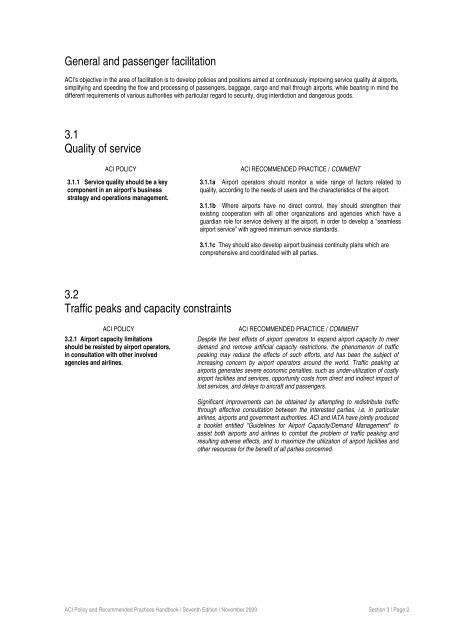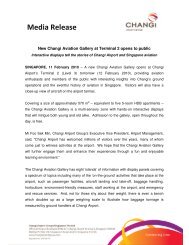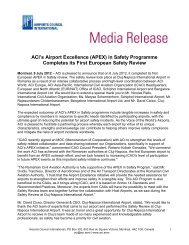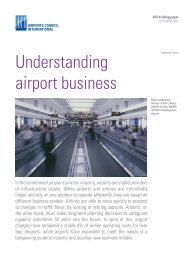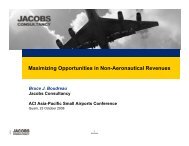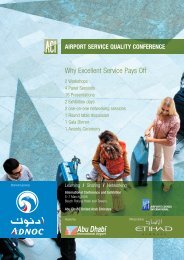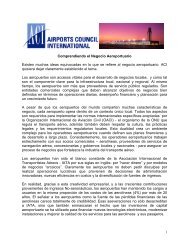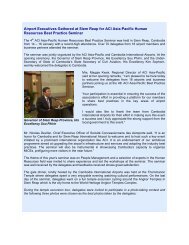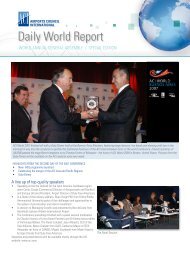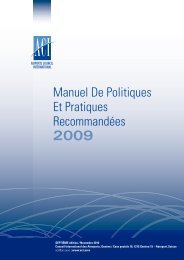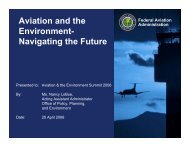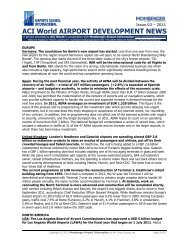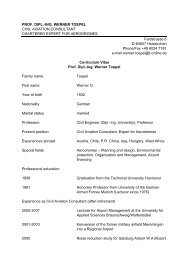General <strong>and</strong> passenger facilitationACI’s objective in the area of facilitation is to develop policies <strong>and</strong> positions aimed at continuously improving service quality at <strong>airport</strong>s,simplifying <strong>and</strong> speeding the flow <strong>and</strong> processing of passengers, baggage, cargo <strong>and</strong> mail through <strong>airport</strong>s, while bearing in mind thedifferent requirements of various authorities with particular regard to security, drug interdiction <strong>and</strong> dangerous goods.3.1Quality of serviceACI POLICY3.1.1 Service quality should be a keycomponent in an <strong>airport</strong>’s businessstrategy <strong>and</strong> operations management.ACI RECOMMENDED PRACTICE / COMMENT3.1.1a Airport operators should monitor a wide range of factors related toquality, according to the needs of users <strong>and</strong> the characteristics of the <strong>airport</strong>.3.1.1b Where <strong>airport</strong>s have no direct control, they should strengthen theirexisting cooperation with all other organizations <strong>and</strong> agencies which have aguardian role for service delivery at the <strong>airport</strong>, in order to develop a “seamless<strong>airport</strong> service” with agreed minimum service st<strong>and</strong>ards.3.1.1c They should also develop <strong>airport</strong> business continuity plans which arecomprehensive <strong>and</strong> coordinated with all parties.3.2Traffic peaks <strong>and</strong> capacity constraintsACI POLICY3.2.1 Airport capacity limitationsshould be resisted by <strong>airport</strong> operators,in consultation with other involvedagencies <strong>and</strong> airlines.ACI RECOMMENDED PRACTICE / COMMENTDespite the best efforts of <strong>airport</strong> operators to exp<strong>and</strong> <strong>airport</strong> capacity to meetdem<strong>and</strong> <strong>and</strong> remove artificial capacity restrictions, the phenomenon of trafficpeaking may reduce the effects of such efforts, <strong>and</strong> has been the subject ofincreasing concern by <strong>airport</strong> operators around the world. Traffic peaking at<strong>airport</strong>s generates severe economic penalties, such as under-utilization of costly<strong>airport</strong> facilities <strong>and</strong> <strong>services</strong>, opportunity costs from direct <strong>and</strong> indirect impact oflost <strong>services</strong>, <strong>and</strong> delays to aircraft <strong>and</strong> passengers.Significant improvements can be obtained by attempting to redistribute trafficthrough effective consultation between the interested parties, i.e. in particularairlines, <strong>airport</strong>s <strong>and</strong> government authorities. ACI <strong>and</strong> IATA have jointly produceda booklet entitled "Guidelines for Airport Capacity/Dem<strong>and</strong> Management" toassist both <strong>airport</strong>s <strong>and</strong> airlines to combat the problem of traffic peaking <strong>and</strong>resulting adverse effects, <strong>and</strong> to maximize the utilization of <strong>airport</strong> facilities <strong>and</strong>other resources for the benefit of all parties concerned.ACI Policy <strong>and</strong> Recommended Practices H<strong>and</strong>book | Seventh Edition | November 2009 Section 3 | Page 2
3.3Code-sharingACI POLICY3.3.1 Code-sharing <strong>and</strong> alliance airlinesshould use the same terminal facilitieswhenever the <strong>airport</strong> operatorconsiders this arrangement feasible<strong>and</strong> it does not jeopardize overalloperation of the terminals.ACI RECOMMENDED PRACTICE / COMMENTCollaborative <strong>and</strong> code-sharing arrangements should be fully transparent topassengers, many of whom choose an airline on the basis of its level of service,frequent flyer programme <strong>and</strong> reputation for effective safety <strong>and</strong> securitymeasures.It is the responsibility of airlines to provide passengers with full writteninformation, firstly at the time of booking/reservation, <strong>and</strong> secondly when ticketsare issued, regarding the operational flight numbers, operating carrier(s),intermediate stops, changes of aircraft, <strong>airport</strong> terminal designators, etc.,involved in the planned journey. Similar recommendations were adopted byECAC in 1996 <strong>and</strong> by the ICAO Air Transport Regulation Panel in 1997, <strong>and</strong> arebecoming a regulatory requirement in an increasing number of countries.Airlines should inform <strong>airport</strong> operators well in advance of all the logistical detailsinvolved in a particular collaborative or code-share arrangement, includingchanges of aircraft at an intermediate <strong>airport</strong> or changes from an international toa domestic terminal (or vice versa) required on the same flight number.With regard to the display of different code share airline identifiers <strong>and</strong> flightnumbers on the FIDS, it is recommended that, where required, these be shownon a rotating basis in an additional column (e.g., ‘Remarks’) on the same line.3.4Simplifying Passenger TravelACI POLICY3.4.1 <strong>Airports</strong> should note theprinciples of the Simplified PassengerTravel (SPT) initiative <strong>and</strong> incorporatethese in their facility <strong>and</strong> processplanning, where appropriate.ACI RECOMMENDED PRACTICE / COMMENTACI is a member of an industry consortium called Simplifying Passenger Travel,whose objectives are to simplify <strong>and</strong> streamline the passenger process; helpimprove aviation security; increase customer satisfaction; make better use ofexisting <strong>airport</strong> space <strong>and</strong> resources; <strong>and</strong> make the transport system moreefficient <strong>and</strong> reduce costs.Strategies of the SPT project are to re-engineer the entire passenger journey,using <strong>and</strong> updating ongoing programmes such as e-ticketing <strong>and</strong> self-servicecheck-in; catalyse industry change through promotion of these concepts <strong>and</strong>explanations of the benefit of their implementation; consider the entire passengerjourney; promote benefits of cooperation, both internationally <strong>and</strong> betweengovernment <strong>and</strong> industry, to find collective solutions; implement newtechnologies for identification <strong>and</strong> communication; ensure international st<strong>and</strong>ardsare established, where necessary; learn from experience by fostering pilotprojects; partner with other groups engaged in related areas; <strong>and</strong> respond tothreats to the aviation industry.Compatibility must exist between the requirements of the relevant governmentinspection agencies at the origin <strong>and</strong> destination of a journey. Procedures relatedto the facilitation of passengers must be developed on an international level toallow for the st<strong>and</strong>ardization of documentation <strong>and</strong> h<strong>and</strong>ling methods. Theseprocedures should recognize the desirability of the eventual replacement ofprocesses now in existence in favour of automation <strong>and</strong> a paperlessenvironment. Governments should also encourage the development ofinternational communications networks allowing for the transmission of databetween governmental agencies within a country <strong>and</strong> between countries.Further information can be found at www.spt.aero.ACI Policy <strong>and</strong> Recommended Practices H<strong>and</strong>book | Seventh Edition | November 2009 Section 3 | Page 3


